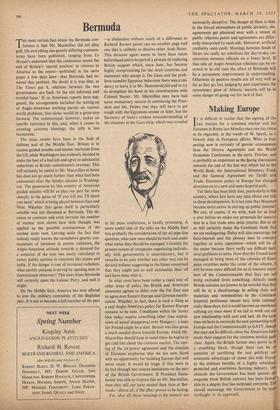Bermuda
j.HE most certain fact about the Bermuda con- ference is that Mr. Macmillan did not play golf. On everything else greatly differing commen- taries have been published, ranging from Le Monde's statement that the conference meant the end of Britain's 'special position' in relation to America to the report—published in the same paper a few days later—that Bermuda had re-' stored that position. No doubt it is true that, as The Times put it, relations between the two governments are back `to the old informal and trustful basis.' If, as American reports have sug- gested, the arrangements included the setting-up of Anglo-American working parties on various world problems, that alone would be a great step forward. The communiqué, however, makes no specific reference to this, and, when it comes to counting concrete blessings, the tally is less favourable; The main results have been in the field of defence and of the Middle East. Britain is to receive guided missiles and atomic warheads from the US, while Washington has evidently decided to make the best of a bad job and agree to substantial reductions in British commitments overseas. This will certainly be useful to Mr. Macmillan at home but does not go much further than what had been announced after the Sandys mission to Washing- ton. The possession by this country of American guided missiles will let us play our part far more cheaply in the game of 'If you kill me, I'll shoot you dead,' which is being played between East and West. Whether that game itself is particularly sensible was not discussed at Bermuda. The de- cision to continue and even increase the number of nuclear tests shows how little thought was applied to the possible consequences of the nuclear arms race. Leaving aside the fact that nobody really knows the cumulative genetic con- sequences of increases in atomic radiation, the Anglo-American attitude towards a demand for a cessation of the tests was nicely calculated to annoy public opinion in countries like Japan and India. If the danger is one of increased radiation, what earthly purpose is served by Opening tests to international observers? This news from Bermuda will certainly upset the Labour Party, and well it might.
On the Middle East, America has now offered to join the military committee of the Baghdad pact. It is not to become a full member of the pact —a distinction without much of a difference as Richard Rovere points out on another page and one that is unlikely to deceive other Arab States. This decision again seems to have been taken beforehand and to be part of a process of replacing British support which, since Suez, has become highly compromising for the Arab countries and statesmen who accept it. On Gaza and the prob- lems raised by Egyptian behaviour there was a ten- dency to leave it to Mr. Hammarskjold and to try to strengthen his hand in his conversations with Colonel Nasser. Mr. Macmillan may have had some momentary success in convincing the Presi- dent and Mr. Dulles that they will have to get tough with the Egyptians sooner or later, but the Secretary of State's evident misunderstanding of the situation in the Gaza strip, which was revealed in his press conference, is hardly promising. A more useful side of the talks on the Middle East was probably the consideration of the oil pipe-line question, what new ones should be built and under what status they should be managed. Certainly the present system of companies negotiating individu- ally with governments is unsatisfactory, but it remains to be seen whether any other way can be devised without suggesting to the States concerned that they might just as well nationalise their oil and have done with it.
In what must have been rather a rapid tour of other areas of policy the British and American statesmen agreed to differ over the Far East and to agree over Eastern Europe and German reunifi- cation. Whether, in fact, there is such a thing as a real Anglo-American policy for Eastern Europe remains to be seen. Conditions within the Soviet bloc today require something other than expres- sions of moral disapproval over Hungary : a loan for Poland might be a start. Britain was also given a much-needed shove towards Europe, which Mr. Macmillan should keep in mind when he begins to get cold feet about the common market. The sign- ing of the six-power agreement and the creation of Euratom emphasise that we are now faced with an opportunity for building Europe that will never recur. It would be tragic if that were to be lost through last-minute hesitations on the part of the British Government. If President Eisen- hower was able to impress this on Mr. Macmillan, then they will not have wasted their time at Ber- muda—above all, if thd effect proves to be lasting.
For, after all, these 'meetings at the summit' are necessarily deceptive. The danger of them is that, in the forced atmosphere of public joviality, dis- agreements get plastered over with a veneer of public relations patter and agreements are differ- entjy interpreted by each side. Moreover, artificial cordiality soon cools. Meetings between heads of States are really no substitute for day-to-day co- operation between officials on a lower level. If that side of Anglo-American relations can be re- stored to its old state the effect of Bermuda will be a permanent improvement in understanding. Otherwise its positive results are all very well as far as they go, but, judging by past experience, the momentary glow of Atlantic warmth will be in some danger of going out for lack of fuel.


































 Previous page
Previous page